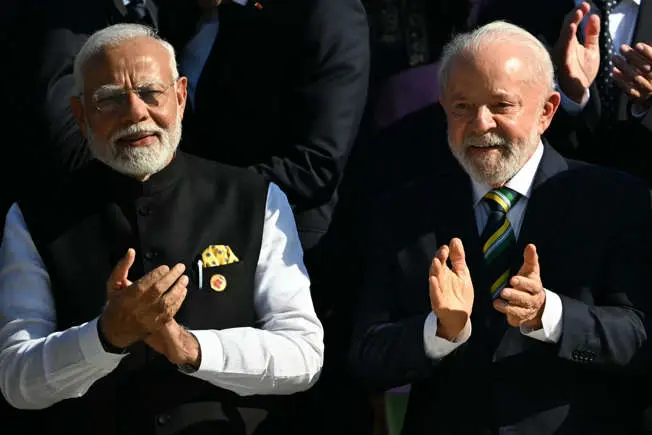
The Brazil-India alliance is more than a reaction to Trump, it’s a blueprint for the future
The Trade War That Shook the World
The global trade landscape has been anything but stable in recent years. With the United States under Donald Trump’s administration launching aggressive tariffs and trade restrictions, particularly targeting China—the ripple effects have reached far beyond the Pacific. Emerging economies like Brazil and India, once peripheral players in global trade disputes, now find themselves at the centre of a new economic realignment.
Trump’s “America First” doctrine disrupted traditional alliances and triggered a wave of protectionism. While the U.S. aimed to curb Chinese dominance, it inadvertently created opportunities for other nations to step into the vacuum. Brazil and India, two of the largest developing economies, saw the writing on the wall: the old rules were crumbling, and it was time to forge new paths.
Rather than retreating into isolation, these two nations chose collaboration. Their partnership isn’t just about trade, it’s a strategic pivot that challenges the dominance of Western economic models and asserts the autonomy of the Global South.
Brazil and India: A Strategic Alliance in the Making
Historically, Brazil and India have shared common ground, both are members of BRICS, both have large agricultural sectors, and both have long sought reform in global institutions like the UN and WTO. But the trade war accelerated their convergence in a way that’s now reshaping global commerce.
In recent years, Brazil has turned to India as a key partner in diversifying its export markets. From soybeans to beef, Brazil is finding eager buyers in India’s growing middle class. Meanwhile, India is leveraging Brazil’s vast natural resources and agricultural expertise to bolster its food security and energy needs.
Joint ventures in pharmaceuticals, renewable energy, and digital infrastructure are also gaining traction. Indian tech firms are expanding into Latin America, while Brazilian agribusinesses are investing in Indian logistics and supply chains. This isn’t just trade, it’s economic symbiosis.
What makes this alliance particularly potent is its defiance of traditional geopolitical expectations. By deepening ties, Brazil and India are signaling that they won’t be pawns in a U.S.-China chess match. They’re crafting their own narrative, one rooted in mutual respect, shared development goals, and a vision for a multipolar world.
Irritating the Giant: Trump’s Reaction and Global Implications
Donald Trump’s administration was never shy about expressing displeasure when allies strayed from the U.S. orbit. Brazil and India’s growing partnership especially when it involved bypassing U.S. trade norms, was met with thinly veiled threats and diplomatic cold shoulders.
For instance, when Brazil increased its exports to India in sectors where the U.S. had traditionally dominated, Washington responded with scrutiny over Brazilian environmental policies and trade practices. India, too, faced pressure over its tariffs and data localization laws, which clashed with American tech interests.
But the irritation wasn’t just economic, it was symbolic. The idea that two developing nations could challenge the status quo and build a trade alliance independent of U.S. influence was a direct affront to Trump’s worldview. His administration viewed global trade as a zero-sum game, and Brazil-India cooperation looked suspiciously like a win that didn’t include America.
Yet, this irritation may have unintended consequences. By pushing countries away, the U.S. inadvertently encouraged them to seek alternatives. Brazil and India’s partnership is now inspiring other nations, like South Africa, Indonesia, and Mexico, to explore similar bilateral arrangements. The age of Western-centric trade may be giving way to a more decentralized, diverse global economy.
The Future of South-South Cooperation
The Brazil-India alliance is more than a reaction to Trump, it’s a blueprint for the future. As global power shifts from West to East and North to South, emerging economies are realizing that cooperation among themselves can be just as powerful as alignment with traditional powers.
South-South trade is growing at an unprecedented rate. Intra-BRICS commerce, regional trade agreements, and digital connectivity are enabling countries to bypass old gatekeepers. Brazil and India are leading this charge—not just through policy but through vision.
Their partnership emphasizes sustainability, innovation, and inclusivity. Whether it’s joint research on climate-resilient crops or shared platforms for digital payments, the collaboration is rooted in solving real-world problems that affect billions.
And perhaps most importantly, it’s a partnership that respects sovereignty. Unlike many Western-led initiatives that come with strings attached, Brazil and India are building a model based on mutual benefit and trust. It’s not perfect, but it’s promising. As the world watches, one thing is clear: the future of global trade won’t be dictated by a single superpower. It will be shaped by alliances like Brazil and India’s, bold, collaborative, and unapologetically independent.
Also read – Lula Strikes Back: Brazil defies Trump’s 50% Tariff Blow Amid Trade Firestorm